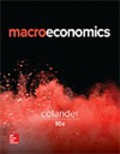
EBK MACROECONOMICS
10th Edition
ISBN: 9781259662447
Author: Colander
Publisher: YUZU
expand_more
expand_more
format_list_bulleted
Question
Chapter 3, Problem 1QAP
(a)
To determine
Problems relating with government intervention.
(b)
To determine
Further effect of central planner’s interference on family choices.
Expert Solution & Answer
Want to see the full answer?
Check out a sample textbook solution
Students have asked these similar questions
Which of the following factors tend to decrease the wage differential between union and non union workers:
unions tend to organize the firms with the lowest ability to pay initially
all of the above
unions must moderate their wage demand to keep workers competitive
some nonunion employers pay their employees above union wages
only ‘a’ and ‘b’ above
The accompanying graph shows the short-run demand and cost situation for a price searcher in a market with low barriers to entry.
Price (dollars)
24
8
MC
ATC
MR
30
D
45 50
Quantity/time
The firm will maximize its profit at a quantity of
units.
After choosing the profit maximizing quantity, the firm will charge a price of
The firm will receive $
in revenue at the profit-maximizing quantity.
The total cost of production for this profit-maximizing quantity is S
The maximum profit the firm can earn in this situation is $
per unit for this output.
How will the situation change over time?
Profits will attract rival firms into the market until the profit-maximizing price falls to the level of per-unit cost.
◇ Losses will induce firms to leave this market until the profit maximizing price falls to zero.
The market will adjust until the price charged by this firm no longer exceeds marginal cost at the profit-maximizing quantity.
This market is already in long-run equilibrium, and will not…
Explain how are kids well being with the poverty simulation.
Chapter 3 Solutions
EBK MACROECONOMICS
Ch. 3.1 - Prob. 1QCh. 3.1 - Prob. 2QCh. 3.1 - Prob. 3QCh. 3.1 - Prob. 4QCh. 3.1 - Prob. 5QCh. 3.1 - Prob. 6QCh. 3.1 - Prob. 7QCh. 3.1 - Prob. 8QCh. 3.1 - Prob. 9QCh. 3.1 - Prob. 10Q
Ch. 3 - Prob. 1QECh. 3 - Prob. 2QECh. 3 - Prob. 3QECh. 3 - Prob. 4QECh. 3 - Prob. 5QECh. 3 - Prob. 6QECh. 3 - Prob. 7QECh. 3 - Prob. 8QECh. 3 - Prob. 9QECh. 3 - Prob. 10QECh. 3 - Prob. 11QECh. 3 - Prob. 12QECh. 3 - Prob. 13QECh. 3 - Prob. 14QECh. 3 - Prob. 15QECh. 3 - Prob. 16QECh. 3 - Prob. 1QAPCh. 3 - Prob. 2QAPCh. 3 - Prob. 3QAPCh. 3 - Prob. 4QAPCh. 3 - Prob. 5QAPCh. 3 - Prob. 1IPCh. 3 - Prob. 2IPCh. 3 - Prob. 3IPCh. 3 - Prob. 4IPCh. 3 - Prob. 5IPCh. 3 - Prob. 6IPCh. 3 - Prob. 7IPCh. 3 - Prob. 8IPCh. 3 - Prob. 9IPCh. 3 - Prob. 10IP
Knowledge Booster
Similar questions
- Case Study: The Impact of Ebola on Tax Revenue in the DRC Background: The Democratic Republic of the Congo has experienced mulitiple outbreaks, with the 2018-2020 outbreak being one of the most severe. The outbreak had profound effects on public health, the economy and government operations. The DRC's economy already fragile due to policital instability and conflict, faced additional stain as the Ebola virus spread across several provinces. Economic disruption: The Ebola outbreak led to significant disruptions in the affected regions. Businesses were forced to close or reduce operations due to quarantine measures and the fear of contagion. this resulted in a sharp decline in economic activities, particularly in sectors such as agriculute, mining and trade. reduced consumer spending and interruptions in supply chains further exacerbated the economic downturn. Impact on Tax Revenue: the economic…arrow_forwardKey shortcomings of the Human Capital approach to measuring the monetary value of benefits of new treatments are that it Will generate lower benefits for male lives on average Will generate higher benefits for female lives on average Will tend to OVERVALUE improvements in quality of life Will tend to UNDERVALUE improved survival for people out of labour forcearrow_forwardOne of the key concepts in economics that underpins the necessity of making tough choices and confronting difficult tradeoffs through some form of collective decision-making is called Production Consumption Exchange Equity Scarcityarrow_forward
- Allocative efficiency WITHIN the health care sector refers to What mix of nonmedical and medical goods and services should be produced in the macro-economy What mix of medical goods and services should be produced in the health economy What specific health care resources should be used to produce the chosen medical goods and services Who should receive the medical goods and services that are producedarrow_forwardProduction efficiency is most concerned with Choice of inputs in production process Quantity of outputs resulting from the production process The technological process of production All of the abovearrow_forwardChoose all of the following that are assumed to be constant while constructing the production possibilities curve Technology Precise mix of inputs Institutional arrangements like judicial protection of business contracts Outputsarrow_forward
- A point that lies OUTSIDE of the PPC can be achieved if A major technological innovation increases production efficiency A sudden influx of resources e.g., massive immigration of trained nurses Economic reform resulting in greater protection of intellectual property rights All of the above Only options 1 and 2arrow_forwardThe marginal benefit from each successive unit of medical care consumed declines BECAUSE each successive unit is more expensive to produce True Falsearrow_forwardIn the Human Capital approach, estimated monetary worth of life is MOST SENSITIVE to which key indicator Discount rate Social security payroll taxes Labour market earnings Workplace injury compensationarrow_forward
arrow_back_ios
SEE MORE QUESTIONS
arrow_forward_ios
Recommended textbooks for you

 Microeconomics: Principles & PolicyEconomicsISBN:9781337794992Author:William J. Baumol, Alan S. Blinder, John L. SolowPublisher:Cengage Learning
Microeconomics: Principles & PolicyEconomicsISBN:9781337794992Author:William J. Baumol, Alan S. Blinder, John L. SolowPublisher:Cengage Learning





Microeconomics: Principles & Policy
Economics
ISBN:9781337794992
Author:William J. Baumol, Alan S. Blinder, John L. Solow
Publisher:Cengage Learning



